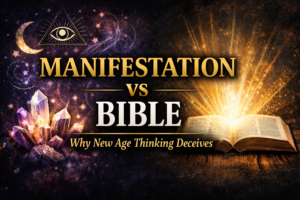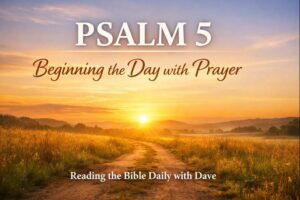⏱️ Estimated Reading Time: 7 min read
Introduction
Psalm 3 is the first Psalm with a title. The title names David as the author and ties the psalm to the occasion of Absalom’s rebellion (2 Samuel 15-16).
Explanation of Psalm 3
The opening of the Psalm in Psalm 3:1-2 lays out the desperate situation, with its repetition of many. The description here ties in well with 2 Samuel 15:12-13 (many) and 16:8 (no salvation for him). Salvation in Psalm 3:2 as generally in the Old Testament refers to both physical and spiritual deliverance from danger. The fact that they are saying this of his soul indicates that the enemies are taunting him: his sins are so bad, they imply that God cannot save him.
The singer in Psalm 3:3-6 calls to mind the variety of ways in which God has cared for him in the past, and how he was able in faith to sleep peacefully in the face of danger. These past experiences build his confidence for the present, enabling him to walk by faith and not by sight. The singer in Psalm 3:7-8 calls on the Lord to save him now as he has in the past. Save in v.7 and salvation in v.8 look back to the taunt in v.2: this rescue is the Lord’s to give or withhold as he sees fit, and not under the control of the enemies. The prayer does not replace work; instead it Is what makes the work more effective.
The singer in Psalm 3:7 is emboldened to ask God for help because God has regularly protected him from enemies by shaming them and rendering them powerless. By looking back to v.2, the singer remembers that it is the decision of the Lord, and not of the enemies, that makes the difference. Your blessing be on your people is a wishing well even for the people who oppose him; but the blessing will require their defeat.
The life of the faithful
Psalm 3 confronts us on a number of fronts. It challenges us with its clear message that the life of the faithful is not a life free from the pain of attack from those who oppose us. None of us desires to be attacked. None of us enjoys the experience when it happens. The attack on the psalmists, however, is of the most severe kind. Not only does it seek to destroy his dignity and honor, but it tries to undermine his very confidence in the good intent of God to bless and save.
Sometimes when we are under attack by a particularly proficient enemy- one who knows us well enough to recognize and exploit our weak spots- we can begin to question our own worth to others, to ourselves, even to God. We live in a world where verbal, psychological, and even physical abuse seems to be commonplace. Neither family nor friends, nor even the church, is above suspicion. The result of having our spirit violated by those we trust is more than anger; often our sense of self is undermined as well. As a result, many go about with questions concerning their value and worth. Often we feel wrong even when we are not. When we take stock of ourselves, we may not see much God would want to save. Our inward uncertainty becomes as strong and as destructive as the outer attacks of the enemy. We can be too easily persuaded that he enemy’s line is right: “God will not deliver you.”
At moments like these- and for some these moments can stretch on for a lifetime- we need to tape into the vision the psalmists hold on to in this psalm, namely, a vision of human honor and dignity that proceeds from God and can only be made real in the heart of each individual by God himself lifting up the head of the person under attack. As long as our dignity and honor come from what we are able to do and accomplish or from what others around us think, we are standing on shifting ground and are unprotected from attack. Human beings fail and public opinion- even that of our closest friends and family- is too often fickle. Only God provides the shield that is both before and behind. Only he is our glory and the lifter of our head.
From another direction, the enemy’s shout challenges us by denying that God is willing or able to meet our need. The enemy’s cry does not only mean that you are not worth saving; it can also be taken to mean that we cannot trust God to deliver.
The psalmist counters the claim of the enemy in ways that remain instructive for us. He relies on past experience of God’s deliverance to provide the foundation of confidence for the present. It is here that the NIV translation of verse 4 obscures the point. What the psalmist is clearly saying is that whenever (in the past, present and future) he calls on Yahweh, Yahweh always has answered and will answer him. This is not simply blind trust or even trust based on unconfirmed experience; rather, thi is trust grounded on god’s acts of deliverance.
Often in the middle of the fray it is difficult to remember how God has earlier acted to save us. That is why we need other means of remembering who God is and how he has benefited us. Scripture is a key testimony to the faithful and gracious intent of God to save us. Reading Scripture brings us again and again into contact with the history of God’s relations with humanity and the world. A wholistic reading of Scripture can leave us with no doubt that God invests human with great dignity, honor, and purpose from creation to the end of Revelation.
It is also clear in Scripture that God’s intention for humanity and the world is good-blessing. In all that he does, Scripture teaches us, God is working for the good of humanity, binding human beings ever closer into the ultimate blessing that is his intention for all creation. God will not be dissuaded or frustrated from accomplishing what he intends for humanity, even by human sin that seeks to destroy us from within or by human evil that seeks our destruction from without.
Along with Scripture and its testimony to the goodwill of God and his power to save, we also need the community of the faithful to add their witnesses to the saving acts of Yahweh. Sometimes our ability to look to our own experience of the saving grace of God is weakened by the painful experience of the present. That is when we need others who can speak a word of hope, grace, and deliverance to us from their own experience. That is the power of community- of life together.
Finally, Psalm 3 challenges us to acknowledge our own moments of anger and hatred and calls us to turn them from cries of vengeance on our enemies into pleas for God to deliver the faithful and to establish his justice. When we have been wounded terribly, it becomes difficult- almost impossible, really- to distinguish our cries for justice (which honors the order and righteousness that god intends for our world) from our desire for vengeance (which satisfies our anger and assuages the pain deep within).
The psalmist’s pleas for God to strike the enemies on the jaw and break the teeth of the wicked has a self-serving edge. It is a cry for vengeance with which we have every right to be uncomfortable. Rather than justifying our own desires for vengeance in which our pain is balanced by exacting an equal or greater pain from another, it ought to drive us to seek the mercy of God that forgives and reconciles and restores the purpose he has for all humanity.


